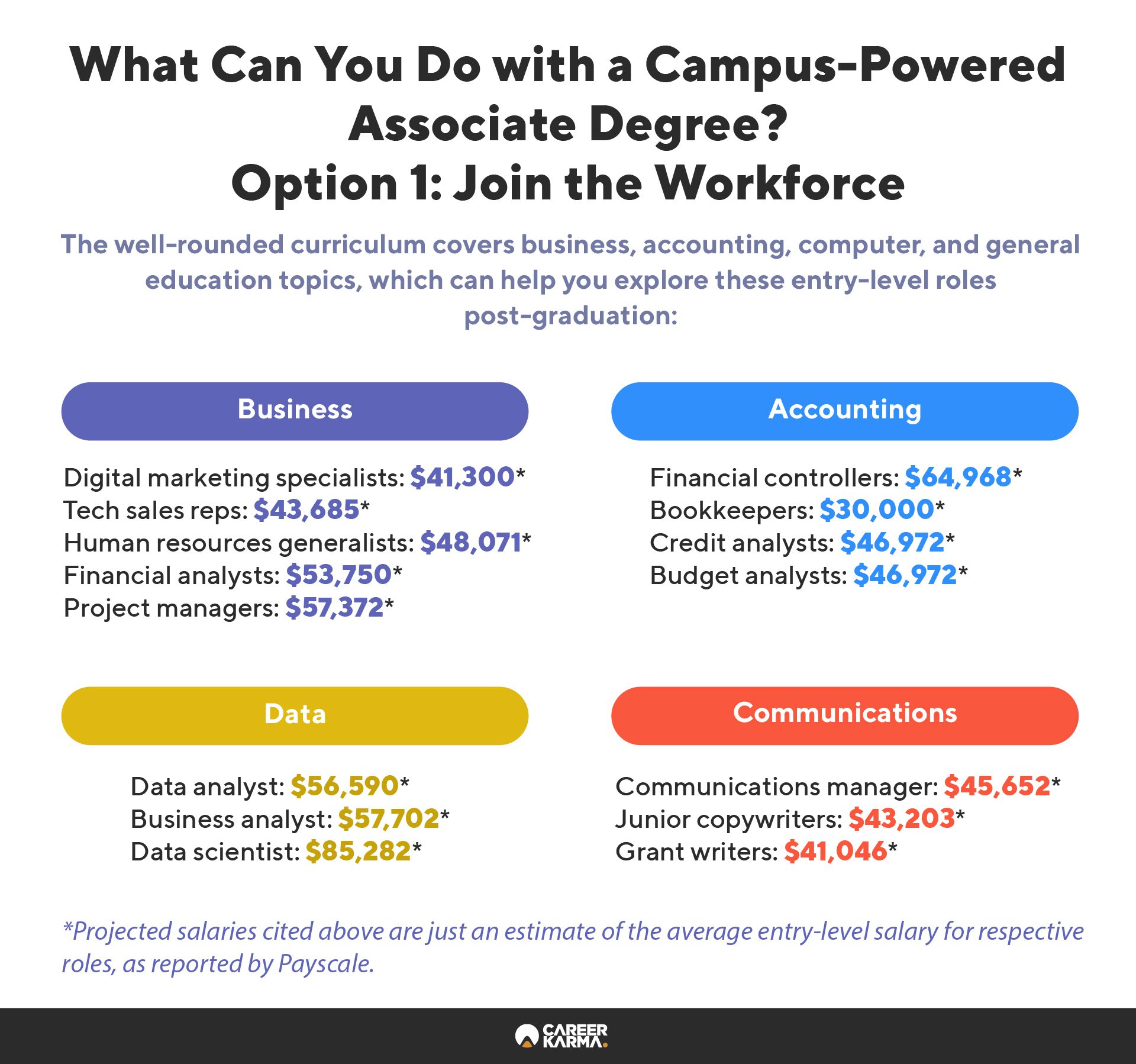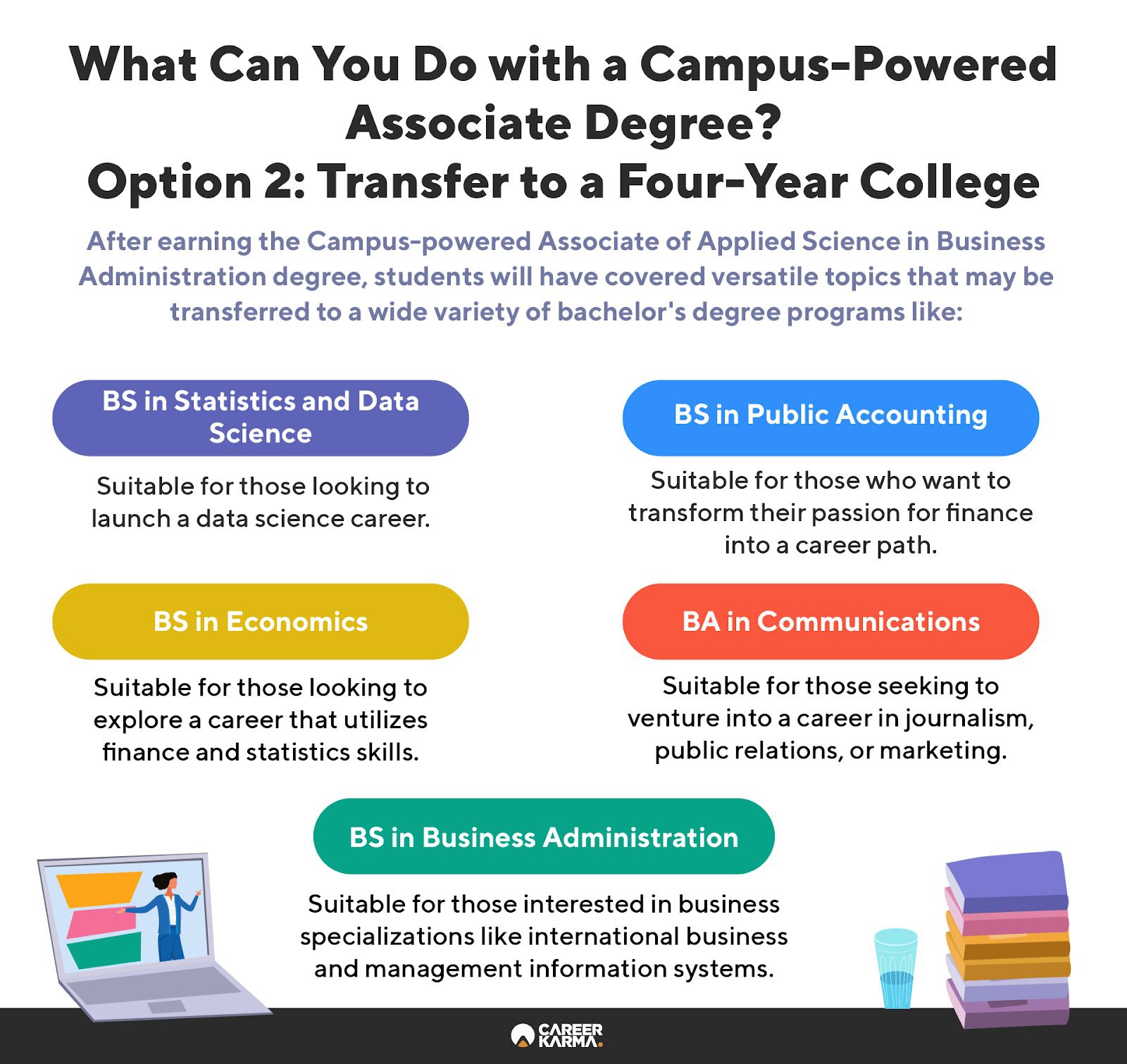It’s time to start valuing two-year degrees. An associate degree is a solid path to increased earning potential over a high school diploma, according to the National Center for Education Statistics. This degree can also lead to a more fulfilling career by increasing your understanding of key concepts and relevant skills.
In our previous article with Campus, we mentioned some of the fields that you can access after earning your Associate of Applied Science in Business Administration (A.A.S.) degree. The courses you take to earn this credential allow you to learn more than just a few entry-level business skills.
By offering this degree at such an accessible price point, Campus seeks to open multiple paths to people that wouldn’t normally have access to them. Throughout the Campus-powered degree program, you’ll take courses designed to make you a well-rounded candidate for many business and financial fields. There are many more pathways out there than you think!
By offering mobile WiFi, laptops, scholarships, and affordable high-quality education, Campus is on a mission to bring high-quality college education to all.
Sign up for Campus-powered program here.What Is Campus?
Campus is an organization that’s dedicated to increasing access to a quality college education. The program is designed for people who may not traditionally have access to a college degree, as well as the opportunities that higher education can provide, including strong networks and resources.
Campus has partnered with Northwestern College to deliver an accredited, affordable online associate in business program. With live classes taught by professors who also teach at top institutions in the country, Campus has made it clear that they put the student experience first. Students get a new laptop, mobile WiFi, free access to their course material and eTextbooks, and more to help them succeed and get that degree.
This online degree program costs $188 per credit hour, bringing the total cost of the program to $6,495 for a three-quarter year—the same amount as the current maximum federal Pell Grant. That means students who receive the full Pell Grant financial award may not have any out-of-pocket tuition expenses at Campus. But if you don’t receive the maximum award, Campus won’t leave you hanging.
As part of their mission to keep college education as accessible as they can, Campus is offering their Trailblazer Scholarship to their first cohort in January 2022. This last-mile scholarship ensures that students who receive the scholarship and enroll in Winter 2022 pay no tuition costs for their first year in the program.
An accessible program that works hard to remove barriers to success is one thing, but what does success after the program look like? If you’re sure you want to get a college degree, but not sure about your next steps after that, then this program offers more than you may realize.
Campus A.A.S. in Business Course Curriculum
The course catalog for Campus’s online business program shows a diverse, career-centric curriculum that you’ll conquer on your path to earning your degree. Since this is a business degree program, you’ll naturally study every category with a business mindset.
However, you’ll still have opportunities to discover your niche in the field or a passion outside of it. The course can be divided into three main sections: business and accounting, computer education, and general education.
After being introduced to business principles, you’ll study business law, management, macroeconomics, and finance. You’ll also touch on marketing, ethics, and human resources management. In your second year at Campus, you’ll be paired with a career coach to support you as you navigate your future beyond the program.
Your accounting courses start with the basics before adding more information from Financial Accounting I to Financial Accounting III. During your computer courses, you’ll cover databases and record-keeping with spreadsheets.
The general education courses cover a range of topics that may serve you in your future field or help you build credit to transfer to a four-year program later on. You’ll have the opportunity to take engaging courses in writing, business communications, and the social sciences. And after that, you have the chance to craft the curriculum that fits you the most!
You can become a better public speaker, dive deeper into the mathematics of business, or learn how to manage computer information systems. You can study psychology, sociology, or learn more about the benefits of diverse business perspectives. You can also take time to learn more about ethics, critical thinking, or get an introduction to the world of business literature.
This diverse curriculum is designed to help students make up their minds about their next steps after completing the ASBA program. With this credential, you can enter the workforce with the niche you discovered during the program. Campus has also emphasized the transfer process while building this course, so you may be able to transfer to another school for a four-year degree if you so desire.
After earning your associate degree, you’ll be able to begin your newly-empowered job hunt with a lot of open doors. You might not know everything possible in the job market with this degree, but we’ve found some possibilities that you may find interesting.
Post-Campus Job Opportunities that Await You

There are a few obvious fields that your experience and coursework may help you enter after graduating from Campus. Business, accounting, and data are strong choices. But you’ll also open yourself up to job titles you might not have considered before attending the program.
Business
You’ll be well equipped to land business-oriented jobs in fields including digital marketing, tech sales, human resources, finance, and project management after graduation.
Digital marketing is an ever-evolving branch of marketing that focuses on using modern technology to discover and capture new customers for a business. Tech sales is an emerging sales field where teams work to bring new customers to a tech-focused business, usually in a B2B context.
You’re probably already familiar with human resources (HR), where a company representative handles employee benefits and compensation while resolving employee and employer conflicts. Finance workers often look at an organization’s earning potential based on certain moves. Project management is another relatively young profession, where leaders help keep projects on time and under budget.
Within these fields, you’ve got several possible job titles. You can find work as a digital marketing specialist, earning an entry-level salary of around $41,300, according to PayScale. Those interested in tech sales can earn a base pay of around $43,685 as an entry-level sales development representative, though with commission their full compensation may be higher!
HR generalists can earn entry-level salaries around $48,071 according to PayScale, while financial analysts tend to earn around $53,750 per year in their first roles. Lastly, project managers earn an average of around $57,372 in entry-level roles.
Accounting
If you’re interested in helping companies keep track of their current financial situation, then accounting might be for you. This field has several key cogs that keep stakeholders informed of a full financial picture.
There are positions like financial controllers, who earn around $64,968 in entry-level roles. Financial controllers manage an organization’s financial department, which requires management skills, and skills with producing reports.
You’ll have to work your way up to a job as a financial controller, but you can start your journey to that role with a job as a bookkeeper, making around $30,000 per year, according to PayScale. Bookkeepers help keep track of an organization’s financial health, which helps them make decisions about their futures.
There are a couple of different analysts that larger organizations rely on to help them make these decisions as well. Credit analysts help determine if people or other organizations can afford loans. Budget analysts help organizations determine a prudent amount of money to devote to each project. Entry-level credit analysts earn around $46,972 per year, while entry-level budget analysts earn an average of $46,972 per year.
Data
All of the aforementioned finance roles rely heavily on data to accomplish their goals. If you find yourself fascinated by data and statistics, you can receive a lot of the basic training you need to get a data job from the ASBA program.
Data analysts look at the past performance of an organization’s initiatives and then present their findings to various stakeholders. To perform their duties, they have to have a great knowledge of programs like Excel to keep track of data. It also helps to have the public speaking and composition skills to present your findings to people who may not be experts on data.
Many data analysts use the position as an entry point into the data science field. After gaining experience with looking at a company’s data and telling stakeholders what it means for their past, you can learn the extra skills you need to help them make decisions about their future.
You can learn how businesses use data more effectively by going the ASBA route. You’ll know exactly which conclusions people in the business world need to do their jobs most effectively, and that might help you stand out from other candidates for open positions.
If you’re thinking of pursuing an entry-level data analytics role, you can expect to earn around $56,590, according to PayScale. Of course, these three options aren’t all you have available after graduation. There are a few more options that you can tackle with an ASBA that may not be as readily apparent.
Communications
You have an opportunity to learn several valuable skills that businesses desperately need to function. You can learn everything you need to start working in public relations if you opt for the courses on business communications, public speaking, and business ethics. Those courses can set you up for a job as a communications manager, making an average entry-level salary of around $45,652, according to PayScale.
If you’d prefer to do more writing than speaking, your general education courses include business communications, composition, and advanced composition. You can write on behalf of businesses as a copywriter, earning around $43,203 as you enter the industry. But you can also help nonprofits secure funding by working as a grant writer, earning around $41,046 in an entry-level role, according to PayScale.
These are just a few of the careers you can start after earning your ASBA. But if you’d prefer to continue your education for other options, you can pursue your bachelor’s degree in several fields.
Post-Campus Bachelor’s Degree Options

We’ve discussed many of the transferable skills that this course provides for students. You’ll learn about statistics, data, accounting, communication, and of course, business. These different routes have numerous applications that you may enjoy. And because you’ll have covered some credits, you won’t have to pay nearly as much to earn a four-year degree.
Bachelor of Science Degree in Statistics
If you like data and statistics, you can get a BS in Statistics from several respectable universities. Because many careers rely on statistics to analyze and present information, Statistics majors can launch careers across several fields, including market research, finance, business, and data science and analytics.
Bachelor of Science Degree in Accounting
If you want to be a certified public accountant (CPA), you need a bachelor’s degree in all 50 states to earn your license. You can apply your love of finance to your education with a BS degree in Public Accounting. If you’d like to adapt your love of finance and statistics to a larger scale, an economics degree may be for you.
Bachelor’s Degree in Communications
We’ve mentioned the communications jobs you can earn with an ASBA, but you might also enjoy a deeper dive into the craft of communications. A communications degree will set you up for a career in journalism, public relations, or marketing.
Bachelor of Science in Business Administration
A BS in Business Administration will set you up for a longer career in business as well, deepening your understanding of the concepts you’ve already started learning in your ASBA program. But there are also more specializations if you’re interested in other business areas, including international business, management information systems, and supply chain management.
An ASBA allows you to choose more routes than you’d have without a degree, and Campus is happy to offer you the chance to see what’s out there.
Maximize Career Opportunities with Campus
No matter your professional aspirations, Campus’s online business degree program has something to offer for everyone. Your future shouldn’t be determined by your finances, and Campus wants to make sure that people who are committed to creating a bright future for themselves have the opportunity to follow through.
If you’re interested in learning more about what Campus has to offer, visit their website today. If you’re ready to join their Winter 2022 cohort, you can begin your Campus admissions process here.
About us: Career Karma is a platform designed to help job seekers find, research, and connect with job training programs to advance their careers. Learn about the CK publication.




